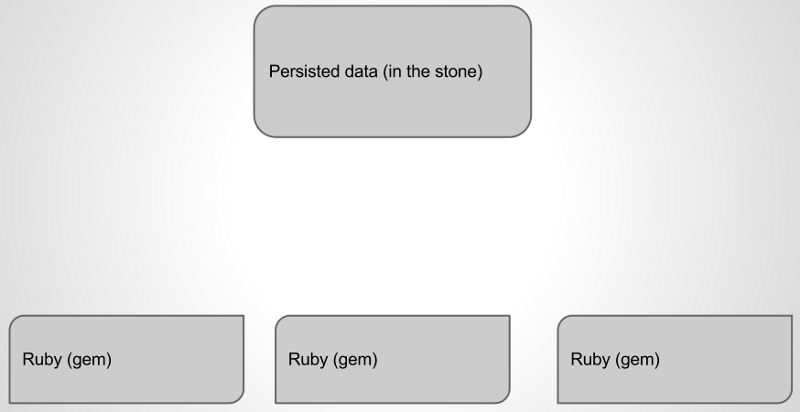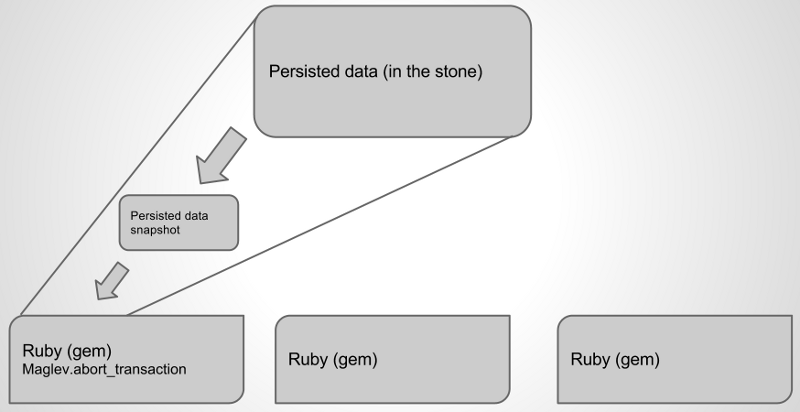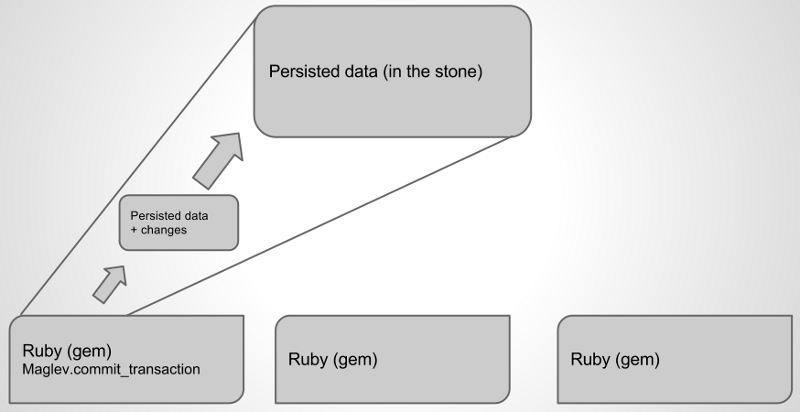| Rails | GemStone/S | |||
|---|---|---|---|---|
| Provided By | Stores | Provided By | Stores | |
| Storage Engine |
MySQL | objects mapped to relational tables | "Stone" object store | Smalltalk objects |
| Memory Cache |
memcached | objects marshalled to strings | Shared page cache | Smalltalk objects |
| Worker Process |
MRI/Mongrel | Ruby objects | "Gem" Smalltalk VM | Smalltalk objects |
| Rails | "GemStone/R" | |||
|---|---|---|---|---|
| Provided By | Stores | Provided By | Stores | |
| Storage Engine |
MySQL | objects mapped to relational tables | "Stone" object store | Ruby objects |
| Memory Cache |
memcached | objects marshalled to strings | Shared page cache | Ruby objects |
| Worker Process |
Ruby/Mongrel | Ruby objects | "Gem" Smalltalk VM | Ruby objects |
So there you have it: GemStone, it's like Rails, but faster and easier. If only it ran Ruby...
GemStone/S is the state-of-the-art platform for developing, deploying, and managing scalable, high-performance, multi-tier applications based on business objects.

Transparent Object Persistence
I've often wished that I could just do something where I just change a bunch of models and at the end of the request cycle something magical goes through and collects up all the models that have changed and persists them, and I haven't really gotten to that level yet. Sometimes I feel that ActiveRecord is holding me back from that.
Avdi Grimm
The Punchline
You can just switch to Java, or .NET.
David Laribee

Persisting objects is hard
Let's go shopping!
Shoehorn
users
| id | name | birthdate | ... | |
|---|---|---|---|---|
| 1 | Jesse Cooke | 9/28/1981 | jesse@jc00ke.com | ... |
| 2 | Jon Doe | 6/23/1972 | jon@doe.name | ... |
Shoehorn
addresses
| id | user_id | street_address | city | ... |
|---|---|---|---|---|
| 1 | 1 | 123 Main St | Portland | ... |
| 2 | 777 | 321 Smith Rd | Denver | ... |
Persistence in OO
Supposed to be simple
And it was... in Smalltalk
The Image

Currently
We store objects as
- Rows & Columns (with types)
- BSON/JSON (with types)
- Strings #yuck
Objects!
Widget.find_by_name("foo")
# or
User.create({ email: "foo@bar.com" })
Some Query Language :(
select * from widgets where name = 'foo';
# or
insert into users...
SQL - The Leaky Abstraction ™
Client.where("orders_count = ? AND locked = ?",
params[:orders],
false)
PORO
Plain Old Ruby Object
class Post < ActiveRecord::Base
end
Object-relational impedance mismatch
Wikipedia
Agile Data
Cunningham & Cunningham
Coding Horror
Time traveller
The future of Ruby is here, it’s just that we have it over in the Smalltalk world and you guys should come and get it.

Avi Bryant
Simple Example
# VM #1
PROOT = Maglev::PERSISTENT_ROOT
pierre = Cat.new("Pierre")
pierre.object_id
# => 1234567
PROOT[:pierre] = pierre
Maglev.commit_transaction
# VM #2
PROOT[:pierre].object_id
# => 1234567
VM Modes
Transient (default)
Persistent
Transient
Maglev.transient do
# Will only be persisted locally
# Won't be written to the stone
end
maglev-ruby foo.rb
Persistent
Maglev.persistent do
# Will be written to the stone
# upon commit
end
maglev-ruby -Mpersistent foo.rb
Transactions
Begin
# Implicit...
Maglev.begin_transaction
Abort
# Revert all persisted classes
# and grab fresh view
Maglev.abort_transaction
What is happening?

Maglev.abort_transaction

Commit
# Attempt to write all changes to persisted
# classes to the stone
Maglev.commit_transaction
Maglev.commit_transaction

Persistence by Reachability
# VM #1
cats = []
pierre = Cat.new("Pierre")
cats << pierre
PROOT[:cats] = cats
Maglev.commit_transaction
pierre.object_id
# => 9876543
# VM #2
persisted_cats = PROOT[:cats]
persisted_cats.first.object_id
# => 9876543
Persistence by Reachability
# VM #3
pierre = PROOT[:cats].first
pierre.toys << :ball_of_yarn
Maglev.commit_transaction
# VM #4
Maglev.abort_transaction
PROOT[:cats].first.toys.first
# => :ball_of_yarn
What can you (easily) persist today?
Arrays
Sets
Hashes
Counters
Sorted Sets
Common theme
Serialization
Expensive (mentally & CPU cycles)
Something more... exotic
k-D Tree
Bloom Filter
Judy Array
Leftist Tree

Mismatch
- It's not just about the objects, but the relations
- It's the graph!
Clojure!
The only nice thing I'll say about databases, as they exist today, or about Java, or other OO languages... the only nice thing I'll say is about transactions. Transactions are awesome. Transactions are composable. We can understand how to reason about them. They're part of what give databases their greatness. So I've got no qualm with transactions.
An example
Blog
class MaglevBlogApp < Sinatra::Application
# ...
before do
@blog = PROOT[:maglev_blogs].first
@posts = @blog.posts
end
get "/" do
erb :index
end
end
class MaglevBlogApp < Sinatra::Application
# ...
get "/posts/:id" do
@post = @posts.detect { |post|
post.slug == params[:slug]
}
erb :post
end
end
class MaglevBlogApp < Sinatra::Application
# ...
post "/post" do
post = Post.new(params[:title], params[:body])
@blog.posts << post
redirect "/"
end
end
class MagLevTransactionWrapper
def initialize(app); @app = app; end
def call(env)
begin
Maglev.abort_transaction
status, headers, body = @app.call env
[status, headers, body]
ensure
commit_if_cool status
end
end
end
class MagLevTransactionWrapper
# ...
private
def commit_if_cool(status=0)
if (200..399).include? status
Maglev.commit_transaction
end
end
end
class MaglevBlog
attr_accessor :posts, :name, :author
def initialize(name, author_name)
@posts = []
@name = name
@author = Author.new(author_name)
end
# ...
end
class MaglevBlog
# ...
class Post
attr_accessor :title, :body
def initialize(title, body)
@title = title
@body = body
post_initialize
end
private
def post_initialize
@slug = SecureRandom.hex(12)
end
end
end
class MaglevBlog
# ...
class Author
attr_accessor :name
def initialize(name)
@name = name
end
end
end
# bootstrap.rb
Maglev.persistent do
load "maglev_blog.rb"
blog = MaglevBlog.new("RubyConf 2012!", "jc00ke")
PROOT[:maglev_blogs] << blog
end
maglev-ruby -Mcommit bootstrap.rb
An example
Worker Queue
World's worst (but easiest) queue
# pseudo
jobs = []
jobs << Proc.new { puts "doing work" }
jobs.shift.call
Slightly-better producer
PROOT[:q] ||= []
while true do
PROOT[:q] << Proc.new { puts "doing work" }
Maglev.commit_transaction
end
Slightly-better worker
while true do
Maglev.abort_transaction
work = PROOT[:q].shift
Maglev.commit_transaction
work.call if work
end
Commit failure?
Slightly-better producer
PROOT[:q] ||= []
while true do
PROOT[:q] << Proc.new { puts "doing work" }
Maglev.commit_transaction
rescue Maglev::CommitFailedException
puts "Couldn't add the job. Retrying..."
redo
end
Slightly-better worker
while true do
Maglev.abort_transaction
work = PROOT[:q].shift
Maglev.commit_transaction
work.call if work
rescue Maglev::CommitFailedException
puts "Someone grabbed this job before me. Go grab another."
redo
end
MagLev-Q
https://github.com/jc00ke/maglev-qWhat's the point?
Totals grouped by language (dominant language first): ruby: 34 (100.00%) Total Physical Source Lines of Code (SLOC) = 34 Development Effort Estimate, Person-Months = 0.07 Schedule Estimate, Months = 0.90 Estimated Average Number of Developers (Effort/Schedule) = 0.08 Total Estimated Cost to Develop = $ 776 (average salary = $56,286/year, overhead = 2.40).
Generated using David A. Wheeler's 'SLOCCount'
Leaderboard
100 points
Leaderboard
| Username | Score |
|---|---|
| @jc00ke | 99 |
| @sproutworx | 99 |
| @mrinterweb | 98 |
Leaderboard
Tied score?
| Username | Score |
|---|---|
| @jc00ke | 100 |
| @sproutworx | 100 |
| @mrinterweb | 98 |
Leaderboard
Tied score?
| Username | Score |
|---|---|
| @sproutworx | 100 |
| @jc00ke | 100 |
| @mrinterweb | 98 |
class LeaderboardItem
include Comparable
def <=>(other)
return 1 if score < other.score
return -1 if score > other.score
0
end
end
Leaderboard
| Username | Score | Timestamp |
|---|---|---|
| @sproutworx | 100 | 12:15:27 |
| @jc00ke | 100 | 12:16:27 |
| @mrinterweb | 98 | 12:15:00 |
class LeaderboardItem
include Comparable
def <=>(other)
return 1 if score < other.score
return -1 if score > other.score
return -1 if timestamp < other.timestamp
return 1 if timestamp > other.timestamp
0
end
end
The moral?
- The logic should be in your app, not in the DB
- Use the data structures we have...
- ... or build the ones you want
- MagLev let's us persist anything, so have fun!
Did I mention...
it's distributed?
Remote Stone
maglev.jc00ke.com
$> cd $MAGLEV_HOME
$> rake netldi:start
startnetldi[Info]: Starting GemStone network server 'gs64ldi'.
startnetldi[Info]: GemStone server 'gs64ldi' has been started.
%> rake maglev:start
startstone[Info]: GemStone server 'maglev' has been started.
My laptop
cd $MAGLEV_HOME
rake netldi:start
startnetldi[Info]: Starting GemStone network server 'gs64ldi'.
startnetldi[Info]: GemStone server 'gs64ldi' has been started.
maglev-ruby --stonehost -e 'puts PROOT[:cats].first.name'
Pierre
Killer feature
Transparent Object Persistence
Killer feature
Transparent Object Persistence
Distributed Transparent Object Persistence
Motivation?
Have fun w/objects
Learn from the past
Make your life easier
Find me later
I want to test out this distributed thing on a bigger scale
with your help ;)
Questions?
Benchmarks are...
Fun
Insightful
Stupid
Fun
How fast?
How many can it handle?
Know where you stand
Insightful
What's slow?
What's not implemented?
What's broken?
Stupid
Micro or Macro?
Applicable?
Just for bragging rights? :(
My view
If you ignore the Stupid, they are Fun & Insightful.
They can be a good tool to diagnose issues & push the implementation
RBS Results
RBS Results
Developer time is worth more than benchmark speed
Uncle Ben
With great benchmarks come great responsibility.
Reveal.js
HTML Presentations Made Easy
Created by Hakim El Hattab / @hakimel
Themes
Reveal.js comes with a few themes built in:
Solarized
* Theme demos are loaded after the presentation which leads to flicker. In production you should load your theme in the <head> using a <link>.
Pretty Code
function linkify( selector ) {
if( supports3DTransforms ) {
var nodes = document.querySelectorAll( selector );
for( var i = 0, len = nodes.length; i < len; i++ ) {
var node = nodes[i];
if( !node.className ) {
node.className += ' roll';
}
}
}
}
Courtesy of highlight.js.